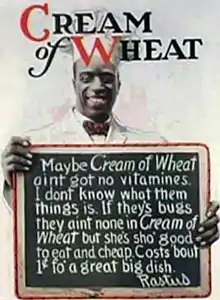
Rastus is a pejorative term traditionally associated with African Americans in the United States. It is considered offensive.[1]
History
Rastus has been used as a stereotypical, often derogatory, name for black men at least since 1880, when Joel Chandler Harris included a black deacon named "Brer Rastus" in the first Uncle Remus book. However, Rastus (a shortening of Erastus, the Greek name of, especially, Erastus of Corinth) has never been particularly popular as a black name. For example, the 1870 census reported only 42 individuals named Rastus in the United States, of whom only four were Black or mulatto.[2]
Rastus—as a stereotypically happy black man, not as a particular person—became a familiar character in minstrel shows. This is documented in Every Time I Turn Around: Rite, Reversal, and the End of Blackface Minstrelsy by Jim Comer,[3] in fiction such as Adventures of Rufus Rastus Brown in Darktown (1906)[4] and Rastus Comes to the Point: A Negro Farce,[5] in popular songs such as Rastus, Take Me Back (1909)[6] and (Rufus Rastus Johnson Brown) What You Going to Do When the Rent Comes 'Round (1905),[7] on radio,[8] and in films, most notably the 1908-1917 Rastus series of short films,[9] with titles that included How Rastus Got His Chicken[10] and Rastus Runs Amuck.[11]
Rastus is also the name of the African-American character who first appeared on packages of Cream of Wheat cereal in 1893 and whose image remained the Cream of Wheat trademark until the 1920s,[12] when it was replaced by a photograph of Frank L. White, a Chicago chef in chef's hat and jacket.
Li'l Rastus was the nickname of an African American youth employed as a mascot by the Detroit Tigers from 1908 to 1910.
Anti-segregation editorialist and publisher Ralph McGill was referred to as "Rastus" McGill by white supremacists.[13]
Filmography
- Rastus Runs Amuck
- How Rastus Got His Chicken
- How Rastus Gets His Turkey
- Rastus Among the Zulus, extant short
- Rastus Knew It Wasn't (1914)[14]
Some promotional materials for Larry Semon's The Wizard of Oz (1925) identified the black farmhand Snowball as Rastus.[15]
Theater
See also
References
- ↑ Marilyn Kern Foxworth, Aunt Jemima, Uncle Ben, and Rastus: Blacks in Advertising, Yesterday, Today, and Tomorrow (1994); Ronald L. Jackson, Scripting the Black Masculine Body 28 - 29 (2006); J. Emmett Winn, Documenting Racism in an Agricultural Extension Film, 38 Film & History 33 (Spring 2008); FAST-US-1 (TRENPK2) Introduction to American English, "Cursing: Obscenities, Expletives and 'Forbidden' Words." FAST-US-1 Intro to American English Reference File, 04-16-2007. Retrieved on 11-08-2007.
- ↑ "Listserv 16.0". listserv.linguistlist.org. Archived from the original on 11 July 2012. Retrieved 3 February 2022.
- ↑ "Every Time I Turn Around". www.angelfire.com.
- ↑ www.bibliopolis.com. "The Adventures of Rufus Rastus Brown in Darktown by George W. Gunn on Classic Books and Ephemera". Classic Books and Ephemera.
- ↑ Rastus Comes to the Point: A Negro Farce essentially a dead link with no information
- ↑ Marie Dressler (30 November 1908). "Rastus, Take Me Back (Coon Song)" – via Internet Archive.
- ↑ Arthur Collins. "Collected Works of Arthur Collins part 2" – via Internet Archive.
- ↑ "Routledge". Routledge.com.
- ↑ "Find - IMDb". IMDb.
- ↑ How Rastus Got His Chicken at IMDb
- ↑ Rastus Runs Amuck at IMDb
- ↑ Dotz, Warren; Morton, Jim (1996). What a Character! 20th Century American Advertising Icons. Chronicle Books. pp. 10–11. ISBN 0-8118-0936-6.
- ↑ "Ralph McGill". May 2011.
- ↑ Richards, Larry (17 September 2015). African American Films Through 1959: A Comprehensive, Illustrated Filmography. McFarland. ISBN 9781476610528.
- ↑ David L. Greene and Dick Martin. The Oz Scrapbook. 1976.
External links
- Connotations of the Names Rastus and Liza An analysis from outside the U.S., from the Department of Translation Studies, University of Tampere, Finland
- blackface From the personal website of william wu
- Was the Cream of Wheat Chef a Real Person? From The Jim Crow Museum of Racist Memorabilia
- The Advertiser's Holy Trinity: Aunt Jemima, Rastus, and Uncle Ben From The Museum of Public Relations
- Collection of mid-twentieth century adverting featuring Rastus from The TJS Labs Gallery of Graphic Design.
- How Rastus Got His Turkey (1910), Short film, Times Review.
- Rastus Among the Zulus (1913), Short film, from The Internet Movie Database
- Rastus Runs Amuck (1917), Short film, from The Internet Movie Database